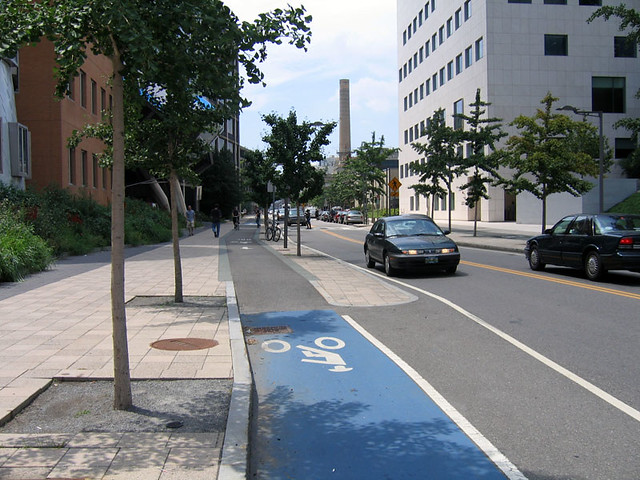Bike lane in Cambridge, Massachusetts
Shareable Cities: The Boom in Biking Benefits Everyone, Not Just Bicyclists
The core of their message is plain common sense: All Americans are better off because biking and walking foster improved public health (and savings in health care expenditures for households, businesses and government), stronger communities and local economies, less congestion, safer streets, lower energy use and a cleaner, safer environment.
While Congressional critics belittle bicyclists as a marginal, almost silly special interest group, others herald them as self-reliant citizens who get around without the need of imported oil and mega-highway projects that cost taxpayers billions. Instead of a boondoggle, continued funding to improve biking and walking conditions in the U.S. represents a sound investment that saves taxpayers money now and in the future.
Grist: Gallery walls: Cities embrace street art as a ticket to success
Launched this month and running through the end of May, Open Walls Baltimore is the city’s first officially sanctioned street art exhibition. Twenty walls throughout the Station North Arts and Entertainment District will serve as backdrops for murals that will be created over the course of several weeks. The walls to be painted are a mix of both private homes and commercial buildings, and represent both occupied and vacant structures. “It’s a museum for street art,” says the artist Gaia, who is curating the event.
Tulsa World: Tulsa councilor fears downtown getting too many parking lots; wants zoning policy
“We need to figure out how to turn surface parking lots into structures, not how to turn structures into surface parking lots,” said City Councilor Blake Ewing, whose district includes downtown.
The councilor plans to “float the idea” on Thursday of a temporary moratorium on the demolition of structures for the creation of surface parking lots until a zoning policy is in place.
“When you look at downtown, it has been stated over and over again that the surface parking lots are breaking up the flow,” he said.
DC.Streetsblog: U.S. PIRG Report: Young Americans Dump Cars for Bikes, Buses
Driving is down: “From 2001 to 2009, the annual number of vehicle miles traveled by young people (16 to 34-year-olds) decreased from 10,300 miles to 7,900 miles per capita – a drop of 23 percent.”
Biking is up: “In 2009, 16 to 34-year-olds as a whole took 24 percent more bike trips than they took in 2001, despite the age group actually shrinking in size by 2 percent.”
The Washington Post: An end to America’s exurbia? For first time, city, urban growth outpaces that of outer suburbs
All across the U.S., residential exurbs that sprouted on the edge of metropolitan areas are seeing their growth fizzle, according to new 2011 census estimates released Thursday.
Gas prices are discouraging long commutes. Young singles prefer city apartments. Two years after the recession technically ended, and despite some signs of economic recovery, there’s a reversal of urbanites’ decades-long exodus to roomy homes in distant towns. Indeed, Americans are shunning any moves at all | the lowest rate in records going back to the 1940s.





Add comment